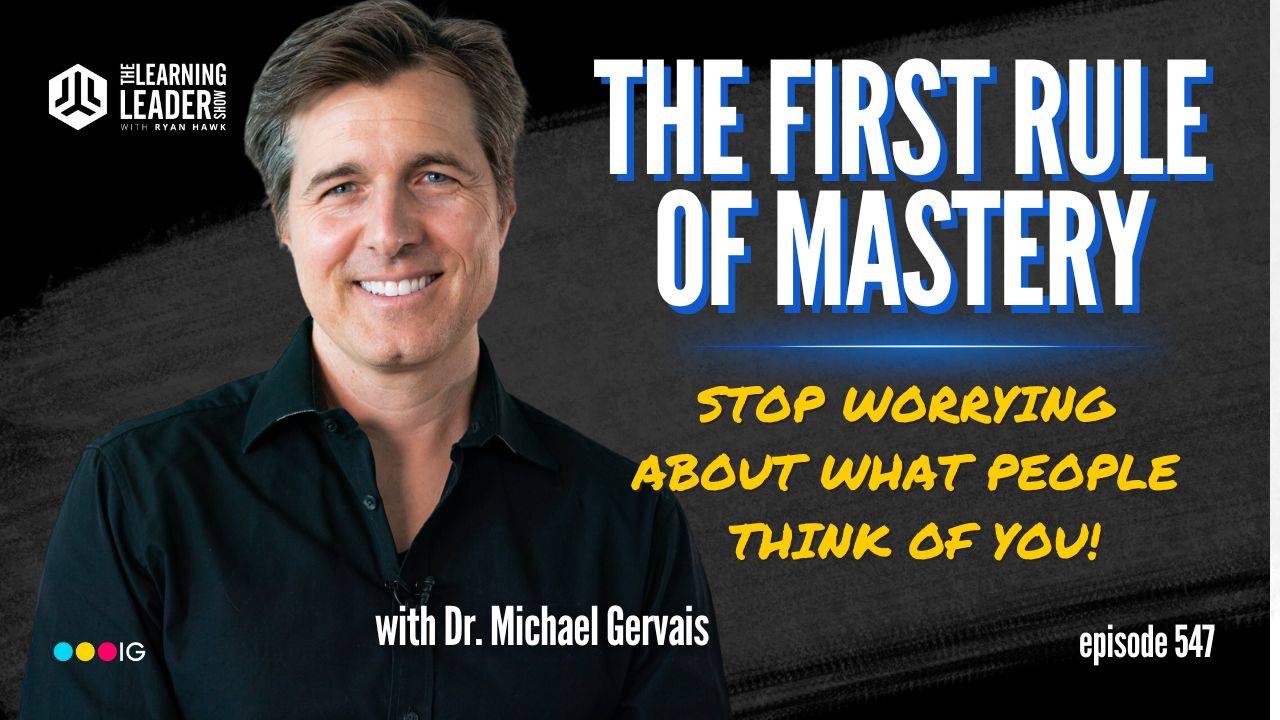Dr. Michael Gervais is one of the world’s top high-performance psychologists. His clients include world record holders, Olympians, internationally acclaimed artists and musicians, MVPs from every major sport, and Fortune 100 CEOs. He is also the founder of Finding Mastery, a high-performance psychology consulting agency, and he’s the author of a new book called, The First Rule of Mastery: Stop Worrying About What People Think of You.
WATCH this conversation on YouTube. And SUBSCRIBE!
Read my book, The Pursuit Of Excellence — See why Patrick Lencioni said “This book is an absolute must-read if you care to live an excellent life.”
FORBES called WELCOME TO MANAGEMENT, “the best leadership book of 2020.”
Be part of “Mindful Monday” — Text Hawk to 66866 Subscribe on iTunes or Stitcher Radio
The Learning Leader Show
- The pursuit of mastery is part of a process. It’s an orientation towards experience. It’s about being fully absorbed in the moment.
- Our fear of other people’s opinions (FOPO) has become irrational and unproductive, and its negative effects reach far beyond performance. If you start paying less and less attention to what makes you you—your talents, beliefs, and values—and start conforming to what others may or may not think, you’ll harm your potential.
- Acknowledgments: “To Lisa, the love of my life. “It’s because of you that I no longer pray for calm waters, but to rather test the strength of our sails.”
- Basing self-worth on performance – when the core motivation of pursuing excellence is proving our self-worth, mistakes, failures, opinions, and criticism are experienced as threats rather than learning opportunities.
- A Learner’s Mindset – A student came to a renowned monk and asked to learn about Zen Buddhism. Shortly after the monk launched into his discourse, the student interrupted him and said, “Oh, I already know that” in an attempt to impress the monk. The monk suggested they discuss the matter over tea. When the tea was ready, the monk poured the tea into a teacup, filled it to the brim—and then continued to pour—spilling tea over the sides of the cup and onto the table. The student watched the overflowing cup until he could no longer restrain himself, “Stop! You can’t pour tea into a full cup.” The monk set the teapot down and replied, “Exactly. Return to me when your cup is empty.”
- “Anchoring our sense of self in discovery is not a cop-out to avoid committing to who we are; rather, it’s simply an acknowledgment that we change with time.”
- Harvard psychology professor Dan Gilbert points out, “Human beings are works in progress that mistakenly think they’re finished.”
- Purpose over Approval – From a young age, we are conditioned to seek approval. Over time, we develop a built-in mechanism to check outside ourselves to see if everything is okay. But… we have another choice. That is our purpose…
- “Purpose is the belief that you are alive to do something. It is an internally derived, generalized intention that’s both meaningful to you and consequential to the world beyond you.”
- Optimism isn’t soft. in fact, it sits at the center of mental toughness. Have you conditioned your mind for optimism?
- Dr. Mike has worked with Satya Nadella, CEO of Microsoft, and his leadership team to develop psychological principles and practices for high-performing teams and cultures.
- As a sport psychology consultant, he was a member of the Seattle Seahawks team for 9 seasons, including two back-to-back Super Bowl appearances (winning in 2014). His primary objective was to assist Head Coach, Pete Carroll, to build a mindset-based culture.
- For Red Bull Stratos, Dr. Mike helped Felix Baumgartner manage his mind and body under pressure for his record-setting skydive from 128,000 feet.
- We need to make a fundamental commitment to practice at the edge of our capacity. One of the prompts I use in my life is, “What did I do today to push my edges?” What did I do that was uncomfortable… And making the commitment to stack day after day of pushing my edges makes that comfort zone bigger and bigger. Ask yourself, “What did I do today to push my edges?”
- FOPO shows up almost everywhere in our lives—and the consequences are great. When we let FOPO take control, we play it safe and small because we’re afraid of what will happen on the other side of critique. When challenged, we surrender our viewpoint. We trade in authenticity for approval. We please rather than provoke. We chase the dreams of others rather than our own.
- Apply to be part of my Leadership Circle
- Read: The Pursuit Of Excellence
- Read: WELCOME TO MANAGEMENT
- Be part of “Mindful Monday” — Text HAWK to 66866
- Connect with me on LinkedIn
- Join our Facebook Group: The Learning Leader Community
- To Follow Me on Twitter: @RyanHawk12
Time Stamps:
More Learning:
Episode 078: Kat Cole – From Hooters Waitress To President of Cinnabon
Episode 216: Jim Collins — How To Go From Good To Great
Episode #300: AJ & Keith Hawk – How To Instill Work Ethic & Curiosity In Your Children
Episode #303: General Stanley McChrystal – The New Definition Of Leadership


Leave A Comment